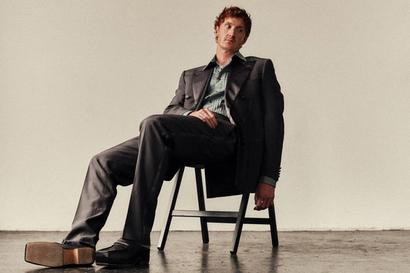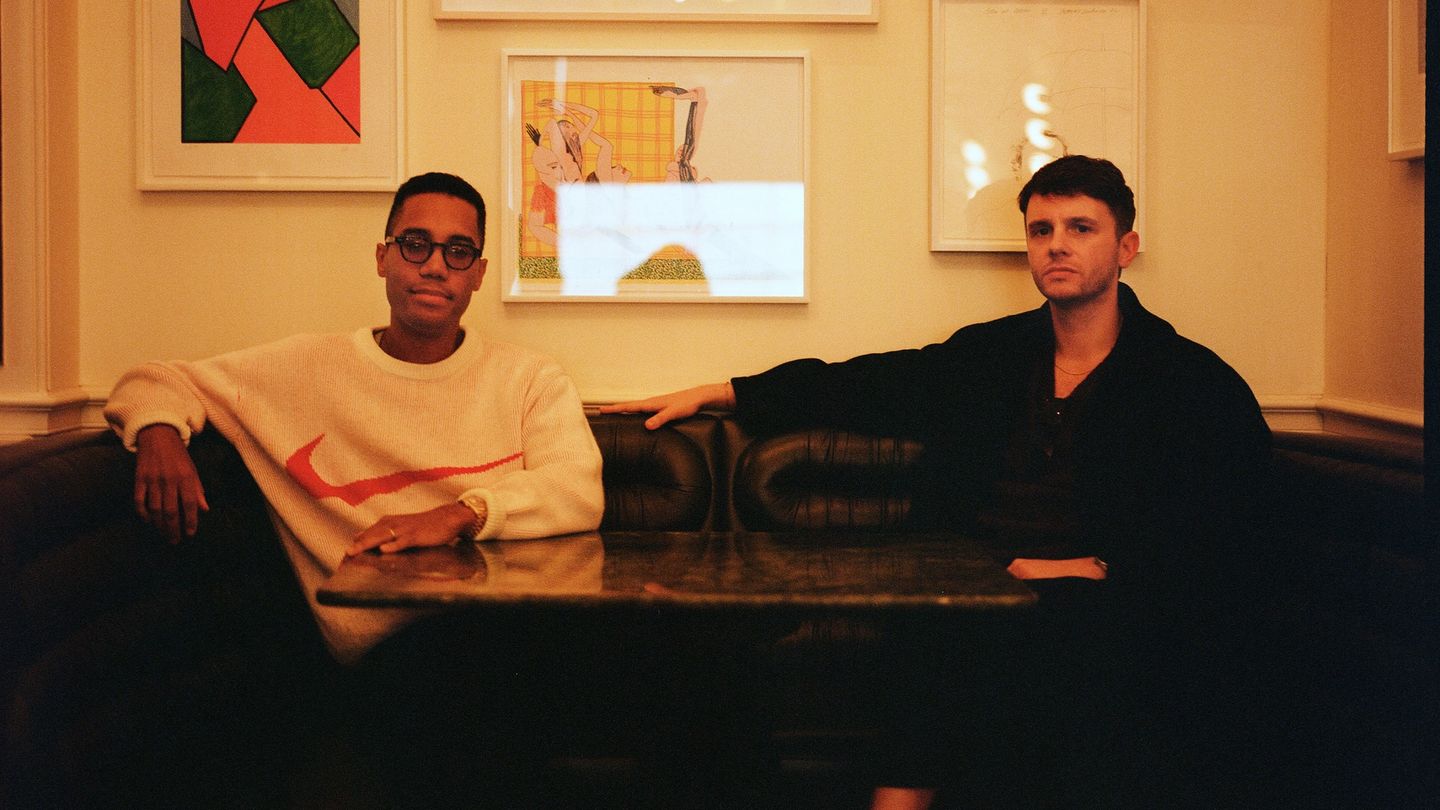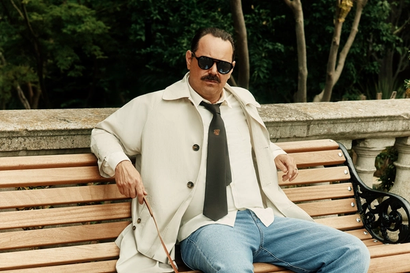

Words: Joseph Bullmore
Photography: Lily Bertrand-Webb
Most people don’t work for a bank because they want to work for a bank – but because they want to be a banker. This is a subtle difference, in the way that enormous differences often are. Working for a bank is hard, and tends to involve either utter boredom or near constant terror, and usually a mingling of both, often before 5.30am. Being a banker, on the other hand, is simple. Understood. Straightforward, despite its baffling complexity. Impressive, even as it slides towards the default. People know what a banker is at a dinner party, even if they don’t quite approve. Your friends won’t mock you for going into finance in the same way that they might if you followed your actual dreams, like stand-up comedy, say, or – oh, I don’t know – lifestyle journalism. Telling people at a bar (read: girls) that you’re a banker makes you sound like a grown up, and, more specifically, like a grown up in the 1980s, back when being a grown up actually sounded fun.
For a young, bright man, uncertain of his place in the world, the title conjures up Rorschach images of red braces and long lunches and guys with power telephones and improbable haircuts – Gordon Gekko, Jordan Belfort, Patrick Bateman; figures whose stories were meant to be cautionary tales, but mainly served as the exact opposite, like reminders not to touch the steak platter because it’s a little hot, or signs above an electric fence. Sometimes, a man’s just got to grasp these things, don’t you find? What’s the alternative? Napkins? Not getting mildly electrocuted? Accountancy degrees? Jobs in the Midlands? Fulfilment and happiness and purpose?
For Mickey Down and Konrad Kay – creators of the excellent show Industry, which skewers this world better than most – the deciding factor was the clothes. “I had visions of Hermès ties and nice suits,” says Down, who worked in M&A for a year or so after graduating from university. “At one point, my friend, who worked in the same place as me, said: ‘Mickey, you realise you don’t actually like finance – you like finance films.’ Which makes total sense now.”
Mickey Down, left, and Konrad Kay
Aesthetics can be a great motivator, Down says. “Everyone wore ties and really nice suits, and had very shiny shoes, and all the old boys wore braces. Even if you’re working 'til 2 o’clock in the morning, you look around and everyone is still wearing their suits and ties. It’s good,” he says. “That can sustain you for a surprisingly long time.” (I have a similar sort of thought around my parents’ mortality and their ensuing funerals: at least I’ll finally have an excuse to wear that gorgeous black cashmere scarf.)
“It felt incredibly high status, as well,” says Kay. “If I put myself back in the shoes of that person then, it was the goldest medal you could achieve, to get an internship at JP Morgan or Morgan Stanley.”
Kay and Down have known each other since they were 17. They are best friends, and constant collaborators. They don’t just finish each other’s sentences – they appear to start them, too. “Konrad can be about to say something, and I’ll know exactly what it is,” says Down at one point during our lunch, describing the natural telepathy of the two in the show’s writer’s room. “And our tastes are identical, too,” says Kay. So, perhaps it’s no surprise that, after going to university together, the pair both went after similar sorts of careers in finance, despite having no real interest in the industry beforehand.
“Industry skewers the banking world”
“It’s an instinct to want to be part of a club,” says Kay. “And, when you’re 21, that’s even stronger, especially if they’re telling you that this is the best club, that you’ll make loads of money, and that everyone will think you’re great.” For people of a certain generation, those that came of age around the time of the 2008 financial crisis, the club looked even more intriguing and exciting, even as – or, perhaps, especially because – the people inside it often seemed to be up to no good. A couple of issues back, I wrote about how one of my favourite pieces of clothing is a green-and-white cap from a Bear Stearns golf day in 2007, made just a few months before the investment bank got significantly fubar’d by its own folly. The back of the cap reads Above Par, which Bear Stearns demonstrably wasn’t. “You can’t make this stuff up,” I wrote, “but you can wear it to the pub.”
Jonah Weiner, the style commentator with the feverishly popular Blackbird Spyplane newsletter, describes the phenomenon as Blackpilled Swag: a world of enthralling garments that can be “complexly fascinating, and, on some ‘heighten the contradictions’ s**t, darkly alluring.” With its strong logos and potent backstories, the niche has now become one of oddly “rockable Cursed Kitsch”, which young men collect like provocative totems or late-capitalist scalps. This doesn’t happen anywhere else. People don’t hunt down the merchandise of defunct accountancy firms or advertising agencies. And they don’t make TV shows about them, either.
Such is the draw and genius of Kay and Down’s Industry. The show, which chiefly follows the careers and lives of a set of graduate trainees at the fictional Pierpoint & Co, allows us the vicarious indulgences and adrenalised energy of the banking game, but without the actual work or the stress or the comedowns. It could only have been made by two people who had worked in the industry, and, perhaps, only by two people who had gotten into it for the wrong sorts of reasons. Down left his job in finance after about a year, and Kay ploughed on at Morgan Stanley for around three.
Even before the end, though, Kay suspected his interests and talents might lie elsewhere – like when the morning update email he sent to clients grew longer and longer, and became more and more literary and ambitious, swelling to include spicy anecdotes from nights out in Amsterdam the evening before, say, like Hunter S Thompson in a Charles Tyrwhitt shirt.
After leaving the business, the pair quickly began writing together in earnest, sustaining themselves with other creative-adjacent jobs on the side. “I went to work for a talent agent, and part of my job was to look after Alexander Armstrong,” says Down. “He was incredibly nice. I was backstage at a taping of Pointless at one point. And, he said: ‘the best advice is just to keep going. If you think you’re good at something, and even if you’re not, just keep going.’”
The pair sold 10 television shows over the years, one of which (Industry, obviously) got made. “I never felt like we weren’t going anywhere. We never stalled out. There was always something,” says Kay.
“The one we came closest to making was a pulpy, violent, regency-costume drama. It couldn’t have been further from Industry,” says Down. Eventually, when Down and Kay were working on another project for the production company Bad Wolf, their boss learned they’d worked in finance, and said that she’d always wanted to do a show about the industry. A pitch was put together for HBO, an old spec script was dug out, and the pair were commissioned to write two episodes and a detailed roadmap. They burned through about 70 drafts of the opening episode.
Did they have impostor syndrome going in? They were very young to be showrunners on a landmark HBO/ BBC show. “Actually, I wish we’d had more of an impostor’s syndrome in season one,” says Down. “If we had realised that we didn’t know what we were doing, we probably would have asked for some more help and mentorship.”
“Yeah. Turns out you need a story for eight hours of TV,” says Kay. “You need stuff that isn’t just Konrad and me trying to make each other laugh,” adds Down. “You need more than vibe and good music, basically.”
Industry is much more than vibe and good music, and the second series, in particular, is exquisitely written and barnstormingly acted. But, even if it wasn’t... my word, what a vibe. The soundtrack, which pulses and thrums with a sort of 1980s fever-dream tension, is remarkable. And, the details are precisely, minutely observed. Kay and Down have a laser eye for outfits in particular.
Industry is often equated to Succession for all sorts of reasons, and a lot of it must be down to the two shows’ clear sense of style. Succession spawned endless earnest think pieces about the rise of ‘quiet luxury’ and ‘old-money dressing’ (even though its characters were distinctly new money and were often anything but quiet) and, along with @gstaadguy, seems to have single-handedly tripled the price of Loro Piana baseball caps. Industry pulled off the same trick with the signifiers of the trading floor.
“Raunch, scandal – sex and drugs and Bloomberg terminals”
What do they think about the show that their own is so often compared to? “I liked Succession,” says Kay. “The first two seasons were great. But, the last show that captured our imagination was Better Call Saul. I genuinely don’t think there is now a show that is at that level. I re-watch shows all the time. The Sopranos. The Thick of It. They are even better than I remember. I watched the British The Office [recently] and thought: ‘I don’t even know how this got made, it’s that good.’” Now, Down says, “There’s just so much shit. And it’s pumped out.” Loro Piana is not what it was, he says. “Naff. Really expensive.”
The other thing Industry does so precisely and particularly is raunch and scandal – sex and drugs and Bloomberg terminals. Do the institutions that the pair used to work at ever get in touch? Are they concerned, at all, about the insights the two may have gleaned from their time there? “My friend who used to work where I used to work went for a meeting with the firm [recently],” says Down. “And he brought up Industry. The guy he was meeting said: ‘Well, obviously you know the guy who wrote that used to work here.’ And the very senior other person in the room said: ‘What?!’ He had no idea. He was shocked. And the whole meeting was derailed.”
“The CEO of Morgan Stanley at the time found out about the show,” says Kay. “And apparently called the global head of HR and said: ‘We need to get this off the air...’”
What other industries deserve the Industry treatment? “Art is interesting,” says Kay. “It is completely unregulated, like finance in the 80s.” Gagosian beware.
Season three of Industry is due this year. Down and Kay aren’t allowed to talk about it yet, though they seem deeply excited about it, and one gets the sense of a triumphant, romping, humdinger of a third album. If you thought season two was bombastic, I’m guessing, just wait for this next one. Along with their old bosses, one man who may decide not to tune in is Rishi Sunak, a former Goldmans guy himself, who Down happened to see at The Spectator summer party, last year. Down leaned through the ring of minders to ask the current(ish) prime minister whether he’d seen the show.
“Yes,” Sunak said.
“Well, did you enjoy it?”
“A little bit explicit for me,” came the reply. As official endorsements go, it’s a doozy.
This feature was taken from Gentleman’s Journal’s Winter 2023 issue. Read more about it here.
Want more TV content? Here's what to watch on Netflix this month…


